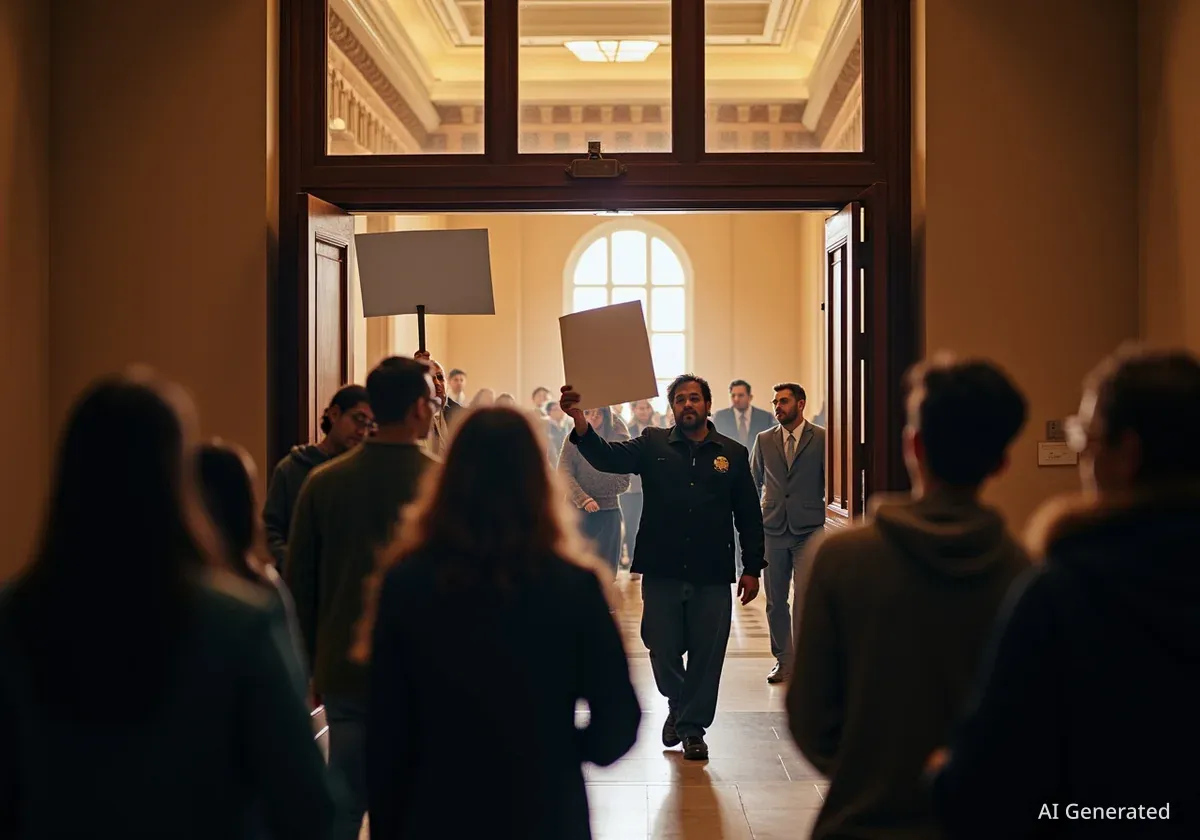The formal inauguration of Gerry Bradley as the 20th president of the University of Louisville was interrupted on Friday by protesters demonstrating in solidarity with Palestine. University officials confirmed that six students were cited for disorderly conduct and criminal trespassing following the incident at L&N Stadium.
Key Takeaways
- Gerry Bradley was officially inaugurated as the University of Louisville's 20th president.
- The ceremony was briefly halted when protesters began shouting and displaying a Palestinian flag.
- Protesters chanted slogans including, "Disclose, divest! We will not stop, we will not rest!"
- Six students were escorted out by officials and subsequently cited for disorderly conduct and criminal trespassing.
- President Bradley continued his speech after the interruption without acknowledging the protesters.
Bradley's Formal Installation Ceremony
The University of Louisville held a formal ceremony on Friday afternoon to inaugurate Gerry Bradley as its new president. The event took place at L&N Stadium, marking a significant moment for the university's leadership. Bradley had been serving as the interim president since March, following the sudden resignation of his predecessor, Kim Schatzel.
Before stepping into the presidential role, Bradley held the position of Executive Vice President and University Provost. His long-standing connection to the university's administration made him a familiar figure to the campus community. The inauguration was intended to celebrate his official appointment and allow him to outline his vision for the institution's future.
A Transition in Leadership
Gerry Bradley's presidency follows a period of transition for the University of Louisville. His appointment as interim president came after Kim Schatzel's departure, and his permanent selection was confirmed by the university's board. His inauguration solidifies his leadership as the university navigates a complex period for higher education nationwide.
Protest Erupts During Presidential Address
Shortly after President Bradley began his inaugural address, the ceremony was disrupted by a small group of protesters. One individual stood up, displaying a Palestinian flag, and began shouting toward the stage. The protester was heard accusing the university leadership of complicity in genocide.
"We charge you with genocide," the first protester stated. "While you may be inaugurated today, you are not our president. We have tried to have dialogue with you."
Almost immediately, a second protester, holding a keffiyeh, a traditional scarf symbolizing Palestinian solidarity, joined in. This individual led a chant that has become common in similar campus protests across the country.
The protesters repeatedly chanted, "Disclose, divest! We will not stop, we will not rest!" This chant calls on university administrations to be transparent about their financial investments and to withdraw funds from companies with ties to Israel.
University's Response and Legal Consequences
Officials present at the ceremony acted quickly to address the disruption. The protesters were surrounded and promptly escorted out of the stadium, allowing the event to resume. President Bradley paused briefly during the interruption but continued with his prepared speech once the protesters were removed. He did not make any direct comments about the incident.
Citations Issued to Students
John Karman, the Vice President of Communications and Marketing for the University of Louisville, confirmed the aftermath of the protest. According to Karman, six students were cited for their involvement. The citations were for two separate offenses: disorderly conduct and criminal trespassing.
The university's decision to issue citations indicates a formal response to the disruption of an official event. The specific charges suggest the students' actions were viewed as exceeding the bounds of permissible protest within the context of the private ceremony.
Bradley Outlines Vision Amid Challenges
In his speech, President Bradley focused on the significant hurdles facing higher education. He acknowledged a landscape marked by economic uncertainty, demographic shifts, and rapid technological change. He also noted the growing public skepticism about the value of academic institutions.
Bradley emphasized the University of Louisville's history of overcoming obstacles. He framed the institution as one defined by resilience and a steadfast commitment to inclusivity. He spoke about the university's dual mission to prepare both Kentuckians and global citizens for future success.
"We gather here at a decisive moment in higher education across the nation and the world," Bradley said. "The University of Louisville has never shied away from challenge. Instead, our history shows us a pattern of resilience, a commitment to inclusivity, to preparing Kentuckians and global citizens for success."
His address aimed to project stability and forward-looking leadership, even as the brief but pointed protest highlighted the political and social tensions present on campus and at universities nationwide.





